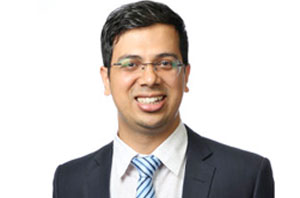Dr. Bishal Gyawali says research into new cancer drugs should focus on outcomes like quality of life and overall survival.
Cancer therapies should help people live longer or live better, and ideally they should do both.
“That’s just common sense,” says medical oncologist Dr. Bishal Gyawali.
But Dr. Gyawali’s research shows that clinical trials for new cancer drugs don’t always prioritize outcomes like quality of life and overall survival. And he worries oncology is losing sight of what matters most to cancer patients.
“What patients care about is how long they’ll live and how well they’ll live,” says Dr. Gyawali, an OICR Clinician Scientist and Associate Professor at Queen’s University. “But unfortunately, these outcomes are frequently not measured or even discussed in clinical trials.”
Dr. Gyawali’s latest research explores how quality-of-life outcomes are reported in clinical trials for new cancer drugs. He worked with colleagues at Queen’s University — including quality of life experts — to conduct a cohort study of recent Phase III trials and published their findings in JAMA Oncology.
To start, they had to exclude a large proportion of trials because the papers didn’t report on quality of life at all. Of studies that did, less than a quarter of therapies actually improved patients’ quality of life. That wasn’t surprising to Dr. Gyawali, who found in a 2018 study that just 42 per cent of cancer clinical trials reported on quality-of-life outcomes, and ones that did mostly reported no improvement.
What surprised Dr. Gyawali in his new study was that when drugs failed to improve quality of life, results were often presented with a favourable spin. Unchanged quality of life was described as “maintained” or “not worsened” in some journal articles, while decreases in quality of life were sometimes written off as “not clinically significant.”
“A patient wants their quality of life to improve,” Dr. Gyawali says. “How can I tell a patient that if you take this drug your quality of life will ‘not be worse?’”
Instead of focusing on quality-of-life outcomes, many studies reported on progression-free survival (PFS), a measure of how much tumours grow or shrink over a period of time. But Dr. Gyawali and colleagues found that improvements in PFS were not necessarily associated with improvements in quality of life. In fact, some cancer therapies that slowed the growth of tumours actually made patients’ quality of life worse and had no effect on how long they survived. Yet, these trials were still framed as successful.
Dr. Gyawali says that raises major questions about the value of PFS as an endpoint. “If a drug delays the growth of the tumour but does not improve survival and worsens quality of life, then we should call that drug harmful,” Dr. Gyawali says.
The JAMA Oncology study reinforces much of Dr. Gyawali’s recent work, which has taken a hard look at oncology research in the hopes of making it more patient-centred.
His interest in this area began shortly after he became a medical oncologist in 2017. He says his medical education in Nepal focused mainly on “textbook medicine,” and he didn’t initially question the evidence behind his textbooks. But studying oncology in Japan opened his eyes to evidence-based medicine, and he started digging deeper into the clinical trials underlying the drugs he was supposed to prescribe.
He says he found flaws in how some trials were structured and reported, which led to expensive cancer drugs that offered little benefit to patients being approved and prescribed. “It was like an epiphany when I first noticed this,” he says. “Then I started seeing it everywhere, and it became my major research theme.”
He approaches this research from various angles, looking at medical education, research processes and policy decisions to see why oncology research can sometimes “forget the bigger picture” of its impact on patients.
And this April, he and his Queen’s University collaborator Dr. Christopher Booth described some overarching problems in a Nature Medicine paper titled “Cancer treatments should benefit patients: a common-sense revolution in oncology.”
“Our overall theme is that cancer treatments should benefit patients and we’re losing sight of that,” Dr. Gyawali says. “So how can we bring the system back in line with what matters to patients?”
Among many recommendations, Drs. Gyawali and Booth suggest changes to medical education to improve doctors’ ability to critically assess literature, changes to clinical trials to focus more on patient-centred outcomes like quality of life and overall survival, and changes to the journal publishing process to ensure that studies are reported without hype or bias.
These and other changes could help ensure oncology is focused on what’s most important, Dr. Gyawali says, and make sure patients and their doctors have the best information to make decisions about their health. “I want a society where patients are more and more aware of these issues,” he says. “Their lives and well-being are literally at stake.”
Dr. Gyawali knows his research is sometimes seen as controversial, and says he gets mixed reactions from colleagues when his papers are published. But he doesn’t think it’s revolutionary to say that cancer therapies should benefit cancer patients.
“If cancer drugs can’t improve a patient’s chance of surviving or improve their quality of life, then we shouldn’t be using those drugs,” he says. “That shouldn’t be controversial.”


